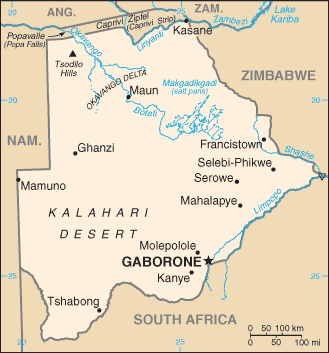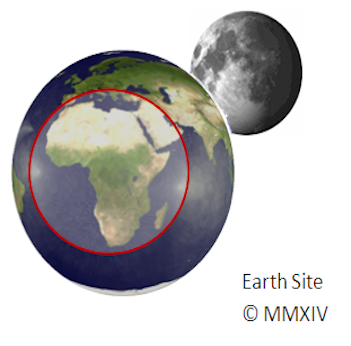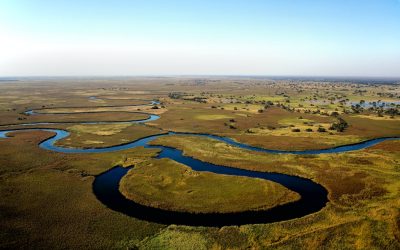Botswana
(Republic of Botswana)








Capital of Botswana: Gaborone
Population (Estimated July 2012): 2,098,018
Area: 581,730 km2 or 224,607 mi2
Currency: Pula (P)
Official Language: English
Political Information: Democratic Parliamentary Republic
Official Religion: No Official Religion (approximately 70% of the population are Christians, 20% have no religious beliefs, 6% have indigenous beliefs and 4% have other religious beliefs)
Highest Point: Kwahu Hill at 1359m or 4,459ft
GDP Official Exchange Rate (OER is more precise at gauging a countries economic power)
(Estimated 2011): $16.4 billion (US$) or £9.84 billion (GBP)
GDP (OER) Per Capita (per member of the population estimated 2011): (US$) or (GBP)
GDP Purchasing Power Parity (PPP is good for gauging living conditions and use of resources but not as accurate as OER. This data has been calculated based on the sum value of all goods and services produced in the country valued at prices prevailing in the United States)
(Estimated 2011): $30.09 billion (US$) or £18 billion (GBP)
GDP (PPP) Per Capita (per member of the population estimated 2011): $16,300 (US$) or £9,780 (GBP)
Time Zone: + 2:00
Wildlife:
Counties/Provinces/States: 9 districts and 5 town councils*; Central, Francistown*, Gaborone*, Ghanzi, Jwaneng*, Kgalagadi, Kgatleng, Kweneng, Lobatse*, Northeast, Northwest, Selebi-Pikwe*, Southeast, Southern
Leaders: President Ian Khama with Mompati Merafhe as Vice President
Sources: CIA World Fact Book, Encyclopaedia Britannica.
Botswana, officially known as the Republic of Botswana, is a landlocked country located in Southern Africa. It is bordered by South Africa to the south and southeast, Namibia to the west and north, and Zimbabwe to the northeast. With a population of approximately 2.3 million people, Botswana is one of the least densely populated countries in the world. Despite its small population, Botswana plays a significant role in the region.
Geography and Climate of Botswana: A Diverse Landscape and Hot Desert Climate
Botswana is known for its diverse landscape, which includes the Kalahari Desert, the Okavango Delta, and the Makgadikgadi Pans. The Kalahari Desert covers most of the country’s land area and is characterized by its red sand dunes and sparse vegetation. The Okavango Delta, on the other hand, is a unique inland delta that attracts tourists from around the world with its abundant wildlife and stunning scenery.
In terms of climate, Botswana has a hot desert climate with very little rainfall throughout the year. The country experiences two main seasons: a dry season from April to October and a wet season from November to March. During the dry season, temperatures can reach up to 40 degrees Celsius (104 degrees Fahrenheit), while during the wet season, temperatures are slightly cooler but still warm.
History of Botswana: From Colonialism to Independence and Economic Growth
Botswana has a rich history that dates back thousands of years. The area that is now Botswana was inhabited by various indigenous tribes, including the San people, who are believed to be one of the oldest cultures in the world. In the 19th century, European explorers arrived in Botswana, followed by British colonial rule in the late 19th century.
Botswana gained independence from Britain on September 30, 1966, and has since experienced remarkable economic growth and development. The country’s economy was initially based on agriculture, but it has since diversified into mining, tourism, and services. Today, Botswana is considered one of the fastest-growing economies in the world and has a high standard of living compared to other countries in the region.
Culture and Society in Botswana: Traditional Values and Modern Developments
Botswana has a rich cultural heritage that is deeply rooted in its indigenous traditions. The country is known for its vibrant music and dance, traditional crafts, and storytelling. The Setswana language is widely spoken throughout the country and is an important part of Botswana’s cultural identity.
In recent years, Botswana has also experienced significant modern developments and changes in society. The country has made great strides in gender equality, with women holding prominent positions in politics, business, and other sectors. Botswana also has a strong commitment to education, with high literacy rates and a well-developed education system.
Wildlife and Nature in Botswana: Home to the Big Five and the Okavango Delta
Botswana is renowned for its abundant wildlife and natural beauty. The country is home to the Big Five – lions, elephants, buffalos, leopards, and rhinoceroses – as well as a wide variety of other animals such as giraffes, zebras, cheetahs, and hippos. The Okavango Delta, a UNESCO World Heritage Site, is one of the most popular tourist destinations in Africa due to its unique ecosystem and diverse wildlife.
Botswana has made significant efforts to protect its wildlife and natural resources through conservation initiatives and sustainable tourism practices. The government has implemented strict anti-poaching measures and has established numerous national parks and game reserves to preserve the country’s biodiversity.
Economy of Botswana: A Mining and Tourism-Driven Nation
Botswana’s economy is primarily driven by mining and tourism. The country is one of the world’s leading producers of diamonds and has a well-developed mining industry. In addition to diamonds, Botswana also has significant deposits of coal, copper, nickel, and soda ash.
Tourism is another major contributor to Botswana’s economy. The country’s diverse wildlife and natural attractions, such as the Okavango Delta and Chobe National Park, attract thousands of tourists each year. The tourism industry provides employment opportunities for many local communities and contributes to the country’s economic growth.
Despite its economic success, Botswana faces challenges such as income inequality, unemployment, and a high HIV/AIDS prevalence rate. The government is working towards diversifying the economy and promoting sustainable development to address these challenges.
Education and Healthcare in Botswana: Progress and Challenges
Botswana has made significant progress in the areas of education and healthcare. The country has a well-developed education system, with high enrollment rates at both primary and secondary levels. Botswana also has several universities and vocational training institutions that provide higher education opportunities.
In terms of healthcare, Botswana has made great strides in combating HIV/AIDS, which was once a major public health crisis in the country. Through comprehensive prevention and treatment programs, Botswana has significantly reduced the prevalence rate of HIV/AIDS and improved access to healthcare services.
However, challenges remain in both education and healthcare. Despite high enrollment rates, there are concerns about the quality of education in Botswana. The government is working towards improving the curriculum and investing in teacher training to address these issues. In healthcare, there is a need for increased access to quality healthcare services, particularly in rural areas.
Politics and Governance in Botswana: A Stable Democracy and Human Rights Advocate
Botswana is known for its stable political system and commitment to democracy and human rights. The country has held regular elections since gaining independence and has a multi-party system. Botswana has a strong tradition of respect for the rule of law and has a well-functioning judicial system.
The government of Botswana has also been a strong advocate for human rights, both domestically and internationally. The country has made significant progress in promoting gender equality and women’s rights, as well as protecting the rights of minority groups.
Tourism in Botswana: Safari Adventures and Cultural Experiences
Tourism is a major industry in Botswana, attracting visitors from around the world with its safari adventures and cultural experiences. The country offers a wide range of activities for tourists, including game drives, boat safaris, bird watching, and cultural tours.
Some of the most popular tourist destinations in Botswana include the Okavango Delta, Chobe National Park, Moremi Game Reserve, and the Central Kalahari Game Reserve. These areas offer unique wildlife viewing opportunities and stunning natural scenery.
In addition to wildlife tourism, Botswana also offers cultural experiences that allow visitors to learn about the country’s rich heritage and traditions. Tourists can visit traditional villages, attend cultural festivals, and participate in traditional dances and music performances.
Future Prospects for Botswana: Sustainable Development and Regional Leadership
Botswana has great potential for sustainable development and is well-positioned to become a regional leader in Southern Africa. The country’s stable political system, commitment to democracy and human rights, and abundant natural resources provide a solid foundation for future growth.
To ensure sustainable development, Botswana needs to continue diversifying its economy and reducing its dependence on mining. The government is investing in sectors such as agriculture, manufacturing, and services to promote economic diversification.
Botswana also has the opportunity to play a leadership role in the region by sharing its experiences and best practices with other countries. The country’s success in areas such as education, healthcare, and wildlife conservation can serve as a model for other countries in Southern Africa.
In conclusion, Botswana is a unique and diverse country with a rich cultural heritage, abundant wildlife, and a growing economy. Despite its challenges, the country has made significant progress in areas such as education, healthcare, and human rights. With its commitment to sustainable development and regional leadership, Botswana has a bright future ahead.
Population Density of Botswana
Botswana, a landlocked country located in Southern Africa, has a relatively low population density compared to other countries in the region. With a total land area of approximately 581,730 square kilometers and a population of around 2.3 million people, Botswana has...
History of Botswana
Botswana, located in Southern Africa, is a landlocked country known for its rich history and cultural heritage. The country has a fascinating past that has shaped its present and will continue to influence its future. Understanding Botswana’s history is crucial...
Terrain and Topography of Botswana: mountains, valleys, and plains.
Botswana, located in Southern Africa, is a landlocked country known for its diverse and stunning terrain. From the vast Kalahari Desert to the lush Okavango Delta, Botswana offers a range of landscapes that are not only visually captivating but also play a crucial...
Climate Zones of Botswana: Different Climate Regions Of Botswana
Botswana, located in southern Africa, is a landlocked country known for its diverse geography and climate. The country is bordered by South Africa to the south, Namibia to the west, Zimbabwe to the northeast, and Zambia to the north. Botswana’s climate is...
Political Boundaries of Botswana: Provinces, Districts, or Historical Boundaries.
Botswana, officially known as the Republic of Botswana, is a landlocked country located in Southern Africa. It is bordered by South Africa to the south and southeast, Namibia to the west and north, and Zimbabwe to the northeast. Botswana gained independence from...
Natural Resources of Botswana: Where Natural Resources are Located in Botswana
Botswana, located in Southern Africa, is a landlocked country known for its rich natural resources. The country is bordered by South Africa, Namibia, Zimbabwe, and Zambia. With a land area of approximately 581,730 square kilometers, Botswana is home to diverse...
Cultural or Historical Sites of Botswana: Important Cultural Landmarks or Historical Sites In Botswana
Botswana is a country rich in cultural and natural heritage. From its iconic Tsodilo Hills to the Okavango Delta, the country is home to a diverse range of sites that are of great importance to both local communities and the world at large. Preserving and promoting...
Discovering the Untouched Beauty of Botswana: A Journey Through the Heart of Africa
Botswana, located in Southern Africa, is a hidden gem that offers travelers a unique and unforgettable experience. With its vast landscapes, diverse wildlife, and rich cultural heritage, Botswana is a destination that should be on every traveler’s bucket list....

























